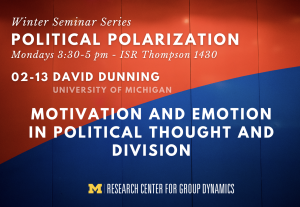Presented By: Research Center for Group Dynamics (RCGD)
RCGD Winter Seminar Series: Motivation and Emotion in Political Thought and Division
David Dunning

David Dunning, Psychology Department; RCGD; University of Michigan
Motivation and Emotion in Political Thought and Division
Whether people adopt conclusions and misinformation that support their political preferences is often thought to be a product of intellectual ability. However, studies suggest that cognitive ability has little to do with whether people endorse politically-friendly falsehoods. I discuss research suggesting that emotional dynamics are very much relevant to false beliefs, such as conspiracy theories, that people adopt in favor of their political leanings. It also underlies motivated reasoning in support of those beliefs.
David Dunning (BA, Michigan State; PhD, Stanford) is a social psychologist focusing primarily on the psychology underlying human misbelief. His most cited work shows that people hold flattering self-opinions that cannot be justified from objective evidence, work supported by the National Institute of Mental Health, the National Science Foundation, and the Templeton Foundation. He has served as president of both the Society of Experimental Social Psychology and the Society for the Science of Motivation.
The U.S. is experiencing unprecedented levels of political polarization relative to the past few decades, especially in terms of affective polarization, or feelings of dislike and distrust towards members of the opposing political party. In this winter talk series, we will hear from experts across disciplines (social psychology, political science, sociology, communication) in order to better understand why political polarization is so high and what, if anything, can we do about it.
RCGD Seminars will be held at ISR Thompson 1430. Events will be recorded. Graduate seminars precede the events from 2-3:30. To meet with external speakers or to find out more about these events, contact Rachael Hamilton at rachaelr@umich.edu.
Motivation and Emotion in Political Thought and Division
Whether people adopt conclusions and misinformation that support their political preferences is often thought to be a product of intellectual ability. However, studies suggest that cognitive ability has little to do with whether people endorse politically-friendly falsehoods. I discuss research suggesting that emotional dynamics are very much relevant to false beliefs, such as conspiracy theories, that people adopt in favor of their political leanings. It also underlies motivated reasoning in support of those beliefs.
David Dunning (BA, Michigan State; PhD, Stanford) is a social psychologist focusing primarily on the psychology underlying human misbelief. His most cited work shows that people hold flattering self-opinions that cannot be justified from objective evidence, work supported by the National Institute of Mental Health, the National Science Foundation, and the Templeton Foundation. He has served as president of both the Society of Experimental Social Psychology and the Society for the Science of Motivation.
The U.S. is experiencing unprecedented levels of political polarization relative to the past few decades, especially in terms of affective polarization, or feelings of dislike and distrust towards members of the opposing political party. In this winter talk series, we will hear from experts across disciplines (social psychology, political science, sociology, communication) in order to better understand why political polarization is so high and what, if anything, can we do about it.
RCGD Seminars will be held at ISR Thompson 1430. Events will be recorded. Graduate seminars precede the events from 2-3:30. To meet with external speakers or to find out more about these events, contact Rachael Hamilton at rachaelr@umich.edu.